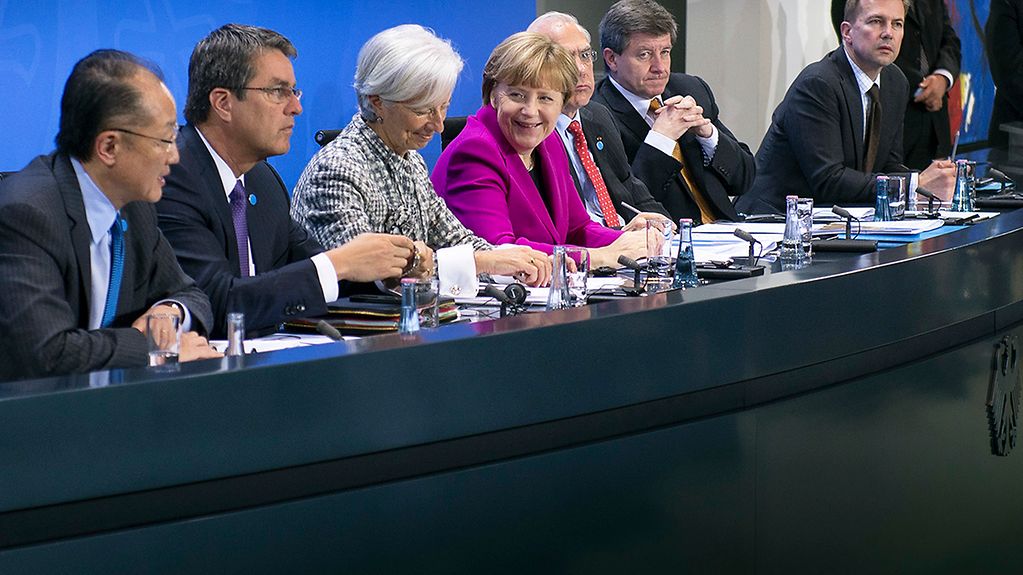Economic meeting at Federal Chancellery
The UN summit on sustainability, the UN Climate Change Conference, Ebola – the Chancellor sees 2015 as a "watershed year for international cooperation". Since Germany holds the G7 Presidency, the discussion is particularly important this year, said Merkel following a meeting with the heads of leading international economic institutions.
3 min reading time

Growth remains fragile as a result of geopolitical risks, says Chancellor
Photo: Bundesregierung Bergmann
The meeting at the Federal Chancellery focused firstly on aspects of the global economy and productivity, reported Chancellor Angela Merkel following her talks with the heads of the OECD, WTO, ILO, IMF and World Bank. Developed nations are now seeing "some growth" said Angela Merkel. The European Union too is once again in a healthier position - "but not yet in a good enough position".
The top-level meeting in Berlin was attended by OECD Secretary-General Angel Gurría, WTO Director-General Roberto Azevêdo, ILO Director-General Guy Ryder, IMF Managing Director Christine Lagarde and World Bank Group President Jim Yong Kim.
Overcoming geopolitical risks
Growth remains fragile as a result of geopolitical risks, said the Chancellor. She believes that work at political level must focus on overcoming these risks. With a view to the terrorist organisation IS and the crisis in Ukraine, she admitted that these are "of course huge challenges".
This will be a watershed year for international cooperation, underscored Angela Merkel. "It is the year in which we will decide on the future of development goals at the UN in New York in September, and in which we will be aiming to underpin financing for development at the conference in Addis Ababa." The Climate Chance Conference in Paris at the end of the year will also look at financing.
Ebola is one focus of the G7 Presidency
Ebola is also on the agenda, along with the question as to what we have learned from the Ebola epidemic. This is why Ebola is one focus of Germany’s G7 Presidency, stressed Angela Merkel.
Along with Norway and Ghana, the German government has suggested that the UN take this matter on board. "The UN Secretary-General has responded extremely positively and over the next two years we aim to take active steps," she said.
Labour standards and women
The talks also looked at efforts to improve the commercial sector. "We currently have a whole series of bilateral agreements, but we also have the multilateral trade system which Germany would like to support," said the Chancellor.
Angela Merkel discussed labour standards with the heads of the organisations represented in Berlin. The question of safety standards at work can be a growth factor or can reduce growth, stated the Chancellor.
Women were another point on the agenda. "The OECD supports us in terms of encouraging women to become self-employed and of ensuring that women participate." All participants agreed that the role of women is a major factor in determining how productive and efficient economic systems are. "And that we still have a lot of work ahead of us," said the Chancellor.
Joint press release
"At a time of moderate and uncertain growth prospects governments have to strengthen reforms and pro-active measures in order to support recovery and ensure growth," stated the heads of the IMF, World Bank, OECD, ILO and the WTO in a joint press release. Ambitious reforms can help to create more productive, more dynamic and more inclusive economies and societies. This will call for intensive cooperation.
More efforts needed
Strengthening growth prospects remains a key priority, continues the press release. Participants welcomed the ongoing efforts by many eurozone countries to enhance their productivity, to raise employment and to improve fiscal positions. It is important to boost investment and revert the recent trend especially of decreasing foreign direct investment flows. The new European Fund for Strategic Investment (EFSI) will contribute to that goal by fostering investment and growth prospects in Europe.
Fighting youth unemployment
Nevertheless, further efforts, especially with respect to youth employment, social inclusion, structural reform and pro-growth consolidation, continue to be urgently needed across eurozone member states. Boosting innovation, improving education and health systems, strengthening productivity, narrowing social divides and strengthening product and labour markets are important policy goals to be achieved by implementing an ambitious reform agenda.